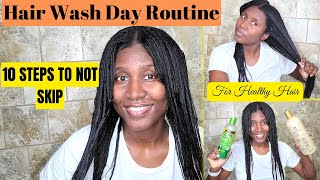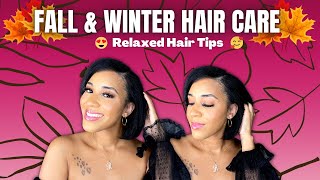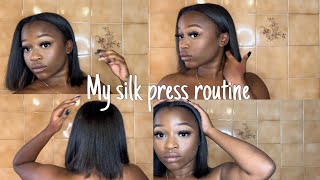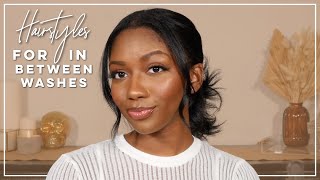Learn How To Care For Relaxed Hair: The 10 Best Practices (Beginner Friendly) | Yawdi Hair Care
- Posted on 04 November, 2022
- Heatless Hairstyles
- By Anonymous
If you're looking to learn how to care for relaxed hair, then look no further! In this video, I'll teach you the 10 best practices for caring for your hair from experience. From washing your hair more often to using the right products, I'll tell you everything you need to know to keep your hair healthy and relaxed!
If you're looking for tips on how to care for your hair, then this video is for you! By the end of this video, you'll know how to care for Relaxed hair the right way, and you'll be able to enjoy beautiful, relaxed hair for years to come!
It'S Yadi hair care and today I'll be giving you guys 10 ways in which you can take care of your relaxed hair without breaking the bank without being stressed out from personal experience, if you're interested in knowing more just go and stick around. No, I just want to pick up unapologetically yours for requesting this video and without further Ado, let's get into the video when I started to take my relaxed hair Journey very seriously, and I wanted to retain length because I was so frustrated with plateauing at shoulder. I started analyzing and looking at certain things that I was doing, and I recognized that the biggest or the semi biggest thing that I was doing was that I wasn't washing my hair as often as I should have. It is a very common notion in the community that we're not supposed to wash our hair when we're relaxing until our next relaxer that I changed and I started washing my hair every two weeks and I also started looking at the type of water that I was Using to wash my hair when I moved to the to the city, I recognized that there was a hard water issue there and or at least in hindsight. No, I recognized that there was a hard water issue there and it would cause my hair to break and I would have like hundreds of breakage on my shoulder. So, in order to go in order to correct that, uh Chile eating or a clarifying shampoo would be great. I'Ve mentioned chelating shampoos before which I just um shampoos that rely on chemically removing heavy metals and so forth from water that can cause build up. So they'll sit on your hair shaft or on your scalp and prevent products from actually entering your hair, which may seem as if the product is not working. When really and Julie. You could just have a build up problem. I also decided to start moisturizing more often, so I got a spray bottle and in my spray bottle, which I know I've spoken about on here before I had water and I had oil at the time olive oil was my big oil, so I would Spritz water In my hair every day, um, if I'm styling it, when I'm going to my bed at night and also, I would start implementing the LC or moisturizing method of which I've also talked about on here before, which is the use of a liquid, a cream and an Oil, for me, the liquid was a leave-in conditioner. The cream was at the time it could be any moisturizing cream that I was using and also my oil, as I said, was olive oil, and I started doubling a little bit with castor oil if I'm not mistaken. At that time as well, and that helps me to basically replace the moisture that I was losing and also trapping it and ensuring that I had a prolonged, um, moisture content balance in my hair. In addition to that, I also started um using moisturizers. So moisturizers was something that I also didn't use a lot. I spoke about just focusing on pink lotion and aloe vera hair polishes that technically do not moisturize your hair, so you need something that is water-based. I also moved away from um heat styling, so I was really really obsessed with my flat iron trust me. I needed bone straight hair, especially when I got bangs, and I thought that I needed to embrace that Asian bang look with the the hair and the buns, and I started using straightening heatless Styles such as wrapping my hair as a way to achieve the same. Look. I also stopped using curling irons to an extent, so I minimize the amount that I was using and I started doing braid outs. These were also a double usage kind of method, where they would act as low maintenance styles to prevent me from having to style my hair daily, which would add pressure and tension to the hair. I also started doing a lot of protective styling which, for me involved wearing caps head wraps so forth. That would basically protect me from environmental damage, such as the UV light from the sun, um debris and dust and particles that would also come and start building up on my hair. In addition to those being mindful of how often you also chemical chemically treated hair is very important, I was never somebody who was interested in colors and dies, but then I recognize that there are a lot of us in the community who are also interested in that. So I opted to add that in there and what I've noticed is that when you are relaxing your hair, the amount of chemicals or the additional chemicals that you add to it can become detrimental. So it's smart to try and find ways that do not um additionally permanently change your hair. So I would recommend using hair wax as colors. If you want to change the color of your hair or simply just wearing protective styles that embody the color that you're trying to achieve as opposed to trying to permanently change the color of your hair. Additionally, I also tried to clip my hair as often as possible. I know this is a pain point for me, because it was the main area as to why I started focusing more on taking care of my hair and what was what I was doing, because I was so frustrated and sick and tired of having to clip my Hair every single time I went to get a relaxer, even though I hated it and hit me, and I Bud my blood boiled. I understood that it was necessary, especially if I was going to wear my hair out more often, which would make my hair ends prone to breakage and split ends, and you know you do not want those to travel up the hair shaft. So it's important to get a trim. How often you need the trim is dependent on you. I really cannot tell you. You just have to listen to your hair and figure out what it means now, moving into listening more about more moving into listening more to your hair, stretching out your relaxes. For me, I stopped processing my hair every six weeks. I tried to put it to probably like eight weeks so I'd give it like every two months, but also that is also subjective, because your hair might be delicate and not able to withstand not being processed for that length of time. Because, while you're transitioning, there becomes that point of vulnerability that can cause your hair to break, especially if you are not focusing on the big thing. Deep conditioning, deep conditioning for relaxed hair and for any type of hair is actually key, and it is the big dog that is the big boy out of everything that I meant to say to you right now. You need to focus on deep conditioning. For me, deep conditioning was done every two weeks which was after during my wash day, so I would wash deep condition and then I'd do whatever else routine that I needed to do no for me at the time I actually did a DIY deep conditioner. So I wasn't buying any store-bought or products store-bought, deep conditioners and if you're interested in the recipe for that just comment down below - and let me know if you want so hear about that DIY, deep condition and how I made it. No, the deep conditioner was basically to put protein into my hair and also it had your mechans and oils to trap, attract and feel in moisture, while also achieving that protein balance. So I was basically doing something to provide protein moisture balance and I'm going to throw in an 11th one. You know I like to give you guys bonus. I don't know why, but I'm just always feeling generous and I feel, like you know what deserve the best. So, for me, the 11th, we that was a game changer for me with lint retention, was dieting, it's very important to focus on what you're eating and ensuring that you're hydrating your body you're, getting your omegas, your vitamin B12 and your B5, which always talk about your Pantanoic acid, which is good for hydration and moisturization, are retaining moisture, yeah and stuff like that. So it's very important that you are helping out your body to not have to put the chopper on things, as I mentioned before, so when your body is deficient in certain nutrients, your hair and your nails are the first to suffer from it. So, in order to ensure that there doesn't need to be any form of compromise or compensation for what you're lacking you're going to put it in while you're also externally supplementing it. So we have come to the end of another video, and I want to take the time out to Big up unapologetically years, a second time for requesting this video. No, I also want to say thank you for kicking it with me, one more good.





Comments
Unapologetically Yours: I honestly appreciate the science behind your videos. Well done Thanks for the shoutout btw. Lovely video
Blair Champagney: Love this ❤❤❤
Sodiane Jones: And me too. Wow
Sodiane Jones: And me too.
Sodiane Jones: Wow!! Look at you